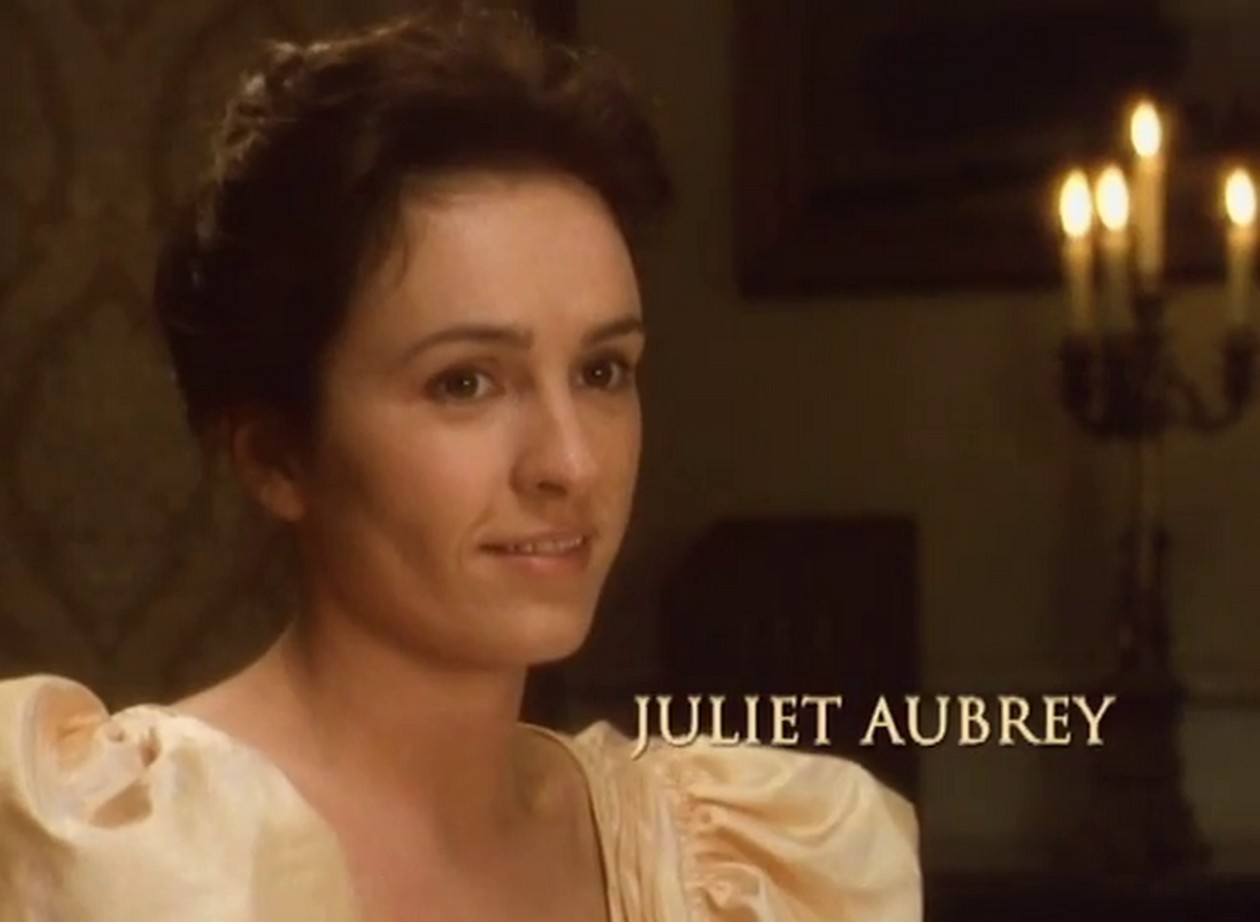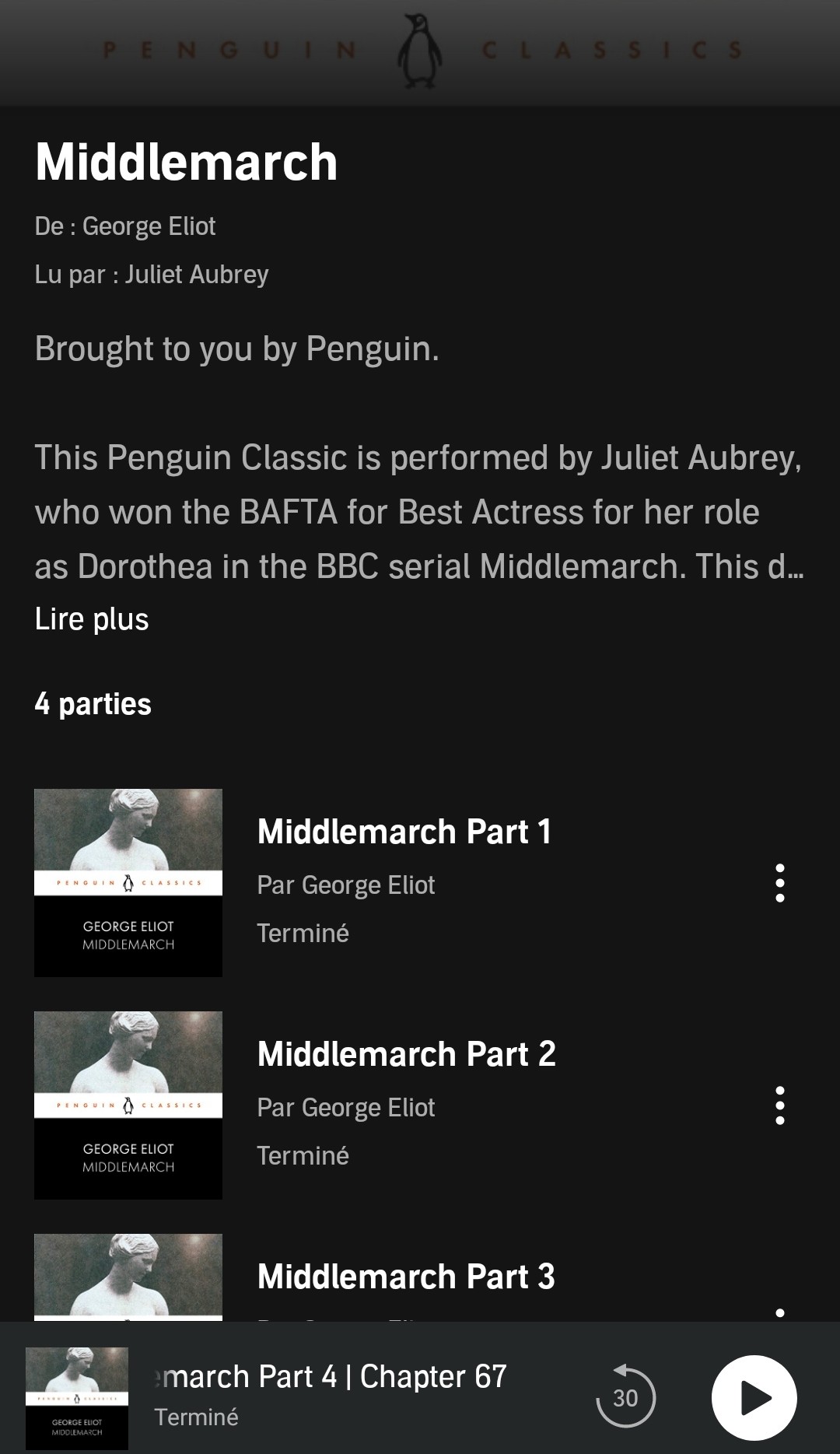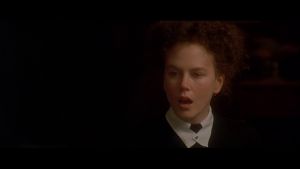
Audiobook: Juliet Aubrey reads Middlemarch. Penguin Audio. 36 hrs 52 mins. By George Eliot (Mary Ann Evans, 1819-1880).
"George Eliot" by Virginia Woolf
The Times Literary Supplement, 20th November, 1919.
"(...) It is not that her power diminishes, for, to our thinking, it is at its highest in the mature Middlemarch, the magnificent book which with all its imperfections is one of the few English novels written for grown-up people. (...)
Those who fall foul of George Eliot do so, we incline to think, on account of her heroines; and with good reason; for there is no doubt that they bring out the worst of her, lead her into difficult places, make her self-conscious, didactic, and occasionally vulgar. Yet if you could delete the whole sisterhood you would leave a much smaller and a much inferior world, albeit a world of greater artistic perfection and far superior jollity and comfort. In accounting for her failure, in so far as it was a failure, one recollects that she never wrote a story until she was thirty-seven, and that by the time she was thirty-seven she had come to think of herself with a mixture of pain and something like resentment. For long she preferred not to think of herself at all. Then, when the first flush of creative energy was exhausted and self-confidence had come to her, she wrote more and more from the personal standpoint, but she did so without the unhesitating abandonment of the young. Her self-consciousness is always marked when her heroines say what she herself would have said. She disguised them in every possible way. She granted them beauty and wealth into the bargain; she invented, more improbably, a taste for brandy. But the disconcerting and stimulating fact remained that she was compelled by the very power of her genius to step forth in person upon the quiet bucolic scene.
The noble and beautiful girl who insisted upon being born into the Mill on the Floss is the most obvious example of the ruin which a heroine can strew about her. Humour controls her and keeps her lovable so long as she is small and can be satisfied by eloping with the gipsies or hammering nails into her doll; but she develops; and before George Eliot knows what has happened she has a full-grown woman on her hands demanding what neither gipsies, nor dolls, nor St Ogg's itself is capable of giving her. First Philip Wakem is produced, and later Stephen Guest. The weakness of the one and the coarseness of the other have often been pointed out; but both, in their weakness and coarseness, illustrate not so much George Eliot's inability to draw the portrait of a man, as the uncertainty, the infirmity, and the fumbling which shook her hand when she had to conceive a fit mate for a heroine. She is in the first place driven beyond the home world she knew and loved, and forced to set foot in middle-class drawing-rooms where young men sing all the summer morning and young women sit embroidering smoking-caps for bazaars. She feels herself out of her element, as her clumsy satire of what she calls 'good society' proves.
Good society has its claret and its velvet carpets, its dinner engagements six weeks deep, its opera, and its faery ball rooms... gets its science done by Faraday and its religion by the superior clergy who are to be met in the best houses; how should it have need of belief and emphasis?
There is no trace of humour or insight there, but only the vindictiveness of a grudge which we feel to be personal it its origin. But terrible as the complexity of our social system is in its demands upon the sympathy and discernment of a novelist straying across the boundaries, Maggie Tulliver did worse than drag George Eliot from her natural surroundings. She insisted upon the introduction of the great emotional scene. She must love; she must despair; she must be drowned clasping her brother in her arms. The more one examines the great emotional scenes the more nervously one anticipates the brewing and gathering and thickening of the cloud which will burst upon our heads at the moment of crisis in a shower of disillusionment and verbosity. It is partly that her hold upon dialogue, when it is not dialect, is slack; and partly that she seems to shrink with an elderly dread of fatigue from the effort of emotional concentration. She allows her heroines to talk too much. She has little verbal felicity. She lacks the unerring taste which chooses one sentence and compresses the heart of the scene within that. 'Whom are you doing to dance with?' asked Mr Knightley, at the Weston's ball. 'With you, if you will ask me,' said Emma; and she has said enough. Mrs Casaubon would have talked for an hour and we should have looked out of the window.
Yet, dismiss the heroines without sympathy, confine George Eliot to the agricultural world of her 'remotest past', and you not only diminish her greatness but lose her true flavour. That greatness is here we can have no doubt. The width of the prospect, the large strong outlines of the principal features, the ruddy light of her early books, the searching power and reflective richness of the later tempt us to linger and expatiate beyond our limits. But is it upon the heroines that we would cast a final glance. 'I have always been finding out my religion since I was a little girl,' says Dorothea Casaubon. 'I used to pray so much - now I hardly ever pray. I try not to have desires merely for myself...' She is speaking for them all. That is their problem. They cannot live without religion, and they start out on the search for one when they are little girls. Each has the deep feminine passion for goodness, which makes the place where she stands in aspiration and agony the heart of the book - still and cloistered like a place of worship, but that she no longer knows to whom to pray. In learning they seek their goal; in the ordinary tasks of womanhood; in the wider service of their kind. They do not find what they seek, and we cannot wonder. The ancient consciousness of woman, charged with suffering and sensibility, and for so many ages dumb, seems in them to have brimmed and overflowed and uttered a demand for something - they scarcely know what - for something that is perhaps incompatible with the facts of human existence. George Eliot had far too strong an intelligence to tamper with those facts, and too broad a humour to mitigate the truth because it was a stern one. Save for the supreme courage of their endeavour, the struggle ends, for her heroines, in tragedy, or in a compromise that is even more melancholy. But their story is the incomplete version of the story that is George Eliot herself. For her, too, the burden and the complexity of womanhood were not enough; she must reach beyond the sanctuary and pluck for herself the strange bright fruits of art and knowledge. Clasping them as few women have ever clasped them, she would not renounce her own inheritance - the difference of view, the difference of standard - nor accept an inappropriate reward. Thus we behold her, a memorable figure, inordinately praised and shrinking from her fame, despondent, reserved, shuddering back into the arms of love as if there alone were satisfaction and, it might be, justification, at the same time reaching out with 'a fastidious yet hungry ambition' for all that life could offer the free and inquiring mind and confronting her feminine aspirations with the real world of men. Triumphant was the issue for her, whatever it may have been for her creations, and as we recollect all that she dared and achieved, how with every obstacle against her - sex and health and convention - she sought more knowledge and more freedom till the body, weighted with its double burden, sank worn out, we must lay upon her grave whatever we have it in our power to bestow of laurel and rose".

***
Marcel Proust, Sur George Eliot :
"Sentiment de la souffrance plus grande dans êtres sans vie spirituelle, sans solidarité morale avec les autres.
Une des conclusions qu'on peut tirer de ces oeuvres (mais qui n'est pas indiquée), c'est que le mal que nous faisons est le mal (nous faisons du mal à nous et aux autres), et qu'au contraire le mal qui nous arrive est souvent la condition d'un plus grand bien que Dieu voulait nous faire."

